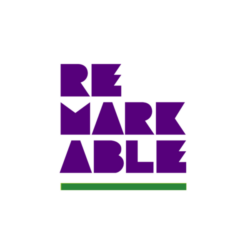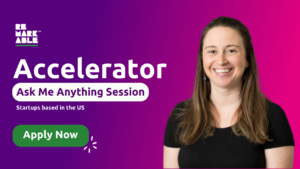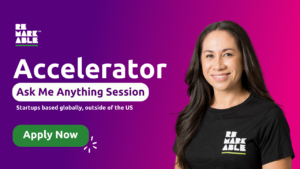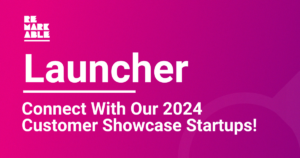Transcript
[00:00] Viv
We would like to acknowledge the traditional owners of the lands on which we record this podcast, the Gadigal people. This is their land, never ceded, always sacred and pay respects to the elders past, present, and emerging of this place.
Coming up on Remarkable Insights.
[00:20] Moaz
This lack of knowledge into what’s happening with disability and disappearance of the impact that disability itself had in our entire technological ecosystem. From text messaging that was first started by people with disability, to the TTY system that first started by people with disability to the T9 communication system that improves our autocorrect today and our iPhones. People forget this history because of how overwhelming and noisy our work is today.
[00:46] Viv
Mission-driven, technologist and strategist Moaz Hamid joins us to talk about his Silicon Valley journey and new mission as an investor dedicated to advancing accessibility and disability technology. Moaz, thank you so much for joining me for an episode of Remarkable Insights. If we could start, would you mind please giving a visual description of yourself and the setting that you’re in?
[01:06] Moaz
Absolutely. So I’m wearing glasses, shaved head, fully shaven actually. And a blue t-shirt, a blue shirt actually. And I am sitting in a bright lit room close to the windows in a cloudy day of Los Angeles surprisingly.
[01:26] Viv
Sounds perfect to me. I would love to be in LA right now. For people who are listening who might not know, would you mind giving us an introduction to who you are and how you got to this point in your life?
[01:38] Moaz
So I’m a technologist. I got into tech up surprisingly, at a very young age because of my mother going everywhere. She’s going around her work, she’s seeing computer, which were popping up everywhere. And she saw that I was breaking stuff in the house to try to discover how they work. And she thought to stop me from doing that to put me in a computer school so at least I know how to build the computer. But what she didn’t realize is that she put me in a coding school. She did not know the difference at the time between the two. So I ended up learning coding at a very young age that led me to have a very bright future, basically in the tech world. So I ended up working in the future of smartphone at a very young age, in a very early days of smartphone helping launch the Treo smartphone that led to me leading an investment and the launch of the HTC brand. And then shortly after it, Skype and Oprah and many of the tech that are very relevant to what we are using today and doing today. That later on, led to me, joining Microsoft to support Windows Mobile and the expansion of Windows Mobile. And then shortly after to Google to do the same with Android and Chrome OS and Google Map and Google Search Appliance and Google Apps for government. And over the last few years, I’ve been focusing my entire life in entrepreneurship and supporting entrepreneurs and helping build entrepreneurship ecosystems specifically.
[03:12] Viv
Wow. And all thanks to mum getting the wrong school.
[03:16] Moaz
Absolutely.
[03:18] Viv
Do you think if you had told your younger self that in the future you’d be working at Silicon Valley with companies like Google and Snapchat, that you would’ve thought that is something that would suit who you are? Or how do you think that where you ended up in life aligns with where you thought you would be?
[03:36] Moaz
Yeah, surprisingly, even though I loved to open devices when I was little and I wanted to experiment with them, including opening the TV at home and trying to connect it to the speaker. And my mum came from work once and found the entire TV and pieces at home. Actually, that first internship that I got with Palm was because I bought a Palm PDA at the time. I sold my desktop to go and buy it, and then few days later it stopped working and with my best friend who was interning at Palm at the time, I tried to fix it, and when we couldn’t fix it, he didn’t know how to help me and he didn’t know what to do. The only thing he thought about was to give me the email of the CEO. So I exchanged emails with the CEO. He sent me a brand new device and gave me my first internship, but it was a very kind thing for him to actually answer a kid who just emailing him and telling him, I’m a kid, emailing you. I just bought my device and it’s not working, and I tried to fix it. I tried everything. It didn’t work. And then he responded with his assistant in CC and asked me what my address was and sent me a brand new device and then exchanged a couple more emails that led to me getting my internship with Palm.
[04:45] Viv
Your career progressed from Palm to then working with people like Snapchat, I believe, and Google and Microsoft. Working with these sort of companies, at what point did you decide that you were gonna pivot and then start your own organization?
[04:59] Moaz
My older brother was in the entrepreneurship scene already. So I was exposed to it also at a very young age. But I found Palm to be my home. I didn’t wanna ever leave Palm for the rest of my life at the time when I started working for Palm. So I started helping my brother on the side and his entrepreneurship journey while I’m working with Palm at the same time. The passion and love I had for the devices allowed me to explain, to use my best friend who was working with me at the time to become my voice in the company. So I used to explain to him about this device and issue with it and think that we could do with it. And he used to go and explain it to the rest of the team and to the rest of the company. And I really wished and hoped that for every autistic child in the world who especially ended up in the work environment, that he has this best friend and has this advocate in their company that is basically always in connection with them and always talking to them and listening to their ideas and bringing their ideas forward. Because I had really incredible ideas for my company that I just couldn’t be in the room saying to 20, 30, 40, 50 people. Sometimes while my best friend was next to me and he used to say, even if I’m in the meeting and I’m too quiet, and he said, this is the idea that I told him. And then he just described my idea and then eventually after two, three, maybe 10 meeting, I can’t remember exactly, I felt comfortable enough to, that when the team asked me ‘can you tell us more’, that I felt comfortable enough to explain to them why I like that idea.
[06:37] Viv
For people who don’t know, what is it exactly that your venture company does?
[06:41] Moaz
So I started to brainstorm and research with my colleague and classmates to think with me around the venture world and what we are doing in the venture world to impact the disability space. And to my surprise, many of them were shocked that we are even discussing this topic, the disability topic. For many of them they thought of disability as just a charity thing that we do to help people with disability. Nobody saw a business opportunity, nobody even heard about the impact that we are having today from not employing people with disability. And the lack of data also was another thing that shocked me because I was trying to find all this data within our census and our CDC and our government organisation, and I couldn’t find a lot of data was missing. So I hired a small research group led by a dear friend and a colleague her name is Jasmine. And we started working together to find this data and research this data and put more knowledge and more ideas around it. And that’s led to us having where it is today, what we’re working on today, which we call Movement Venture, MVMT Venture. So MVMT Venture is the first venture studio and a venture fund that is dedicated to make technology more accessible and reduce the unemployment for people with disability. So that’s the goal and our mission at Movement Venture. So we look for people from an idea stage and from early stage and support them through their ideas to mature their idea and make it more empowering and more accessible to more people, and then prepare them to become venture backable. And then bring them into our second firm, which is the Venture Fund, where we help fund them and take them to what’s next.
[08:31] Viv
There’s so many pieces of technology and innovation that are ubiquitous with everyday life that were created by people with disability to solve a problem or to remove a barrier they were experiencing. And now that benefits everybody. When you talk about people still seeing disability as a charity rather than a business opportunity. How is that so when we have so many of these examples that we could show people, where is that sort of breakdown in communication and awareness, and why is it still happening?
[09:02] Moaz
Yeah. So the reason it’s happening that I discovered so far is because nobody is bringing the topic of disability into the forefront of what they see every day in the news. So today, when you open the news and you open YouTube and you open anything that you get news from, you see the number one topic is cryptos and AI. There is nothing else happening in the world except cryptos and AI. And because of that and the way that people are exposed to news today it’s very limited and it’s not showing them what’s happening really in the world, unfortunately. And also with how much connected we are today with the amount of technology we have, we are even way more disconnected than how our parents were connected. And it’s completely shocking that now everyone carrying two and three iPhones and devices that connect to each other and all day messaging and iMessaging people, and they still don’t even know what’s happening in their own neighborhood. And this was not the case for our parents and our parents before them. And this disconnect of communication between us and our community is what’s resulting into this lack of knowledge into what’s happening with disability. And this appearance of the impact that disability itself had in our entire technological ecosystem, from text messaging that first started by people with disability to the TTY system that first started by people with disability to the T9 communication system that improve our auto correct today and our iPhones. That also started by the community with disability. All of these features, to voicemail, and all of this all started by the disability community, but people forget this history because of how overwhelming and noisy our work today.
[10:47] Viv
Moaz, we need you on our marketing team. We’ve got time for one last question and what we like to ask guests is invite you to leave listeners with a Remarkable Insight that could be a piece of advice or some sort of thought or question you want to leave them with to think about after this episode has ended.
[11:06] Moaz
I am seeing more and more innovation today in the disability space that are coming from small nonprofits. And this small nonprofit they discover these features and they discover these solutions for their community. And usually nonprofit in United States specifically, but probably globally also are launched by a family member who face those disability and somehow they discover the solution and they start using this solution. And because they’re not thinking global today and they’re just thinking about the community aspect of what they’re doing, they end up supporting a small piece of their community. Empowering this nonprofit I discovered that it’s going to be something that is going to be very significant to the work that we are doing in the disability space. So for everybody who’s trying to do something in the space from government to venture world, to nonprofits who are well funded, to also look for these small nonprofit who are doing small things in small communities and empower them and support to do things at scale, to bring this technology to flourish and to be in front of other people who also need them. And from that we’ll discover new innovation that we could have never imagined. And I believe completely that the space of disability will bring us the next wave of innovation that we are all desperate for. And instead of the repetitive innovation that we are seeing today in the venture world, we see the same fund funding, the same technology, same startup over and over again expecting different result when there is this whole space with new innovation and new idea that is underfunded today. That’s what I want to leave your audience to think about. And these small ways and small ideas that they might think of them as small today. They’re still worth sharing, and they could turn into something really significant.
[13:10] Viv
Thank you to our guest, and hopefully you found your own Remarkable Moment. Make sure you subscribe to the podcast and follow on Instagram at @remarkable_tech for unheard moments from this episode. Talk with you all on the next one!





